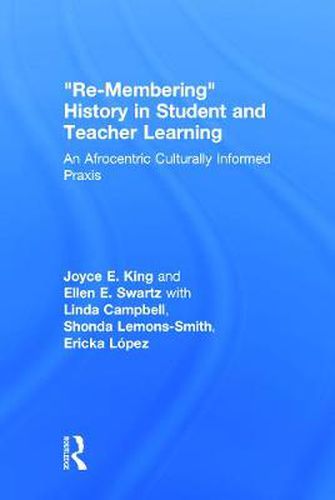Readings Newsletter
Become a Readings Member to make your shopping experience even easier.
Sign in or sign up for free!
You’re not far away from qualifying for FREE standard shipping within Australia
You’ve qualified for FREE standard shipping within Australia
The cart is loading…






What kind of social studies knowledge can stimulate a critical and ethical dialog with the past and present? Re-Membering History in Student and Teacher Learning answers this question by explaining and illustrating a process of historical recovery that merges Afrocentric theory and principles of culturally informed curricular practice to reconnect multiple knowledge bases and experiences. In the case studies presented, K-12 practitioners, teacher educators, preservice teachers, and parents use this praxis to produce and then study the use of democratized student texts; they step outside of reproducing standard school experiences to engage in conscious inquiry about their shared present as a continuance of a shared past. This volume exemplifies not only why instructional materials-including most so-called multicultural materials-obstruct democratized knowledge, but also takes the next step to construct and then study how re-membered student texts can be used. Case study findings reveal improved student outcomes, enhanced relationships between teachers and families and teachers and students, and a closer connection for children and adults to their heritage.
$9.00 standard shipping within Australia
FREE standard shipping within Australia for orders over $100.00
Express & International shipping calculated at checkout
What kind of social studies knowledge can stimulate a critical and ethical dialog with the past and present? Re-Membering History in Student and Teacher Learning answers this question by explaining and illustrating a process of historical recovery that merges Afrocentric theory and principles of culturally informed curricular practice to reconnect multiple knowledge bases and experiences. In the case studies presented, K-12 practitioners, teacher educators, preservice teachers, and parents use this praxis to produce and then study the use of democratized student texts; they step outside of reproducing standard school experiences to engage in conscious inquiry about their shared present as a continuance of a shared past. This volume exemplifies not only why instructional materials-including most so-called multicultural materials-obstruct democratized knowledge, but also takes the next step to construct and then study how re-membered student texts can be used. Case study findings reveal improved student outcomes, enhanced relationships between teachers and families and teachers and students, and a closer connection for children and adults to their heritage.